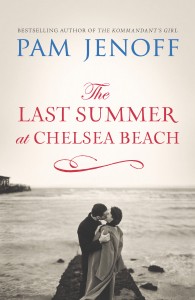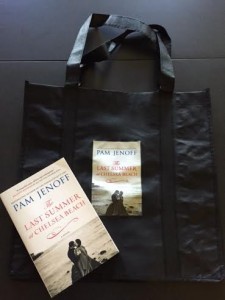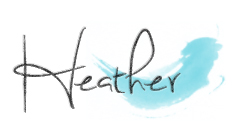Happy Wednesday, and I’m thrilled to bring you the first excerpt from Pam Jenoff’s historical romance, The Last Summer At Chelsea Beach. Check out the excerpt below and be sure to enter the excellent giveaway at the bottom.

Summer 1941
Young Adelia Monteforte flees fascist Italy for America, where she is whisked away to the shore by her well-meaning aunt and uncle. Here, she meets and falls for Charlie Connally, the eldest of the four Irish-Catholic boys next door. But all hopes for a future together are soon throttled by the war and a tragedy that hits much closer to home.
Grief-stricken, Addie flees—first to Washington and then to war-torn London—and finds a position at a prestigious newspaper, as well as a chance to redeem lost time, lost family…and lost love. But the past always nips at her heels, demanding to be reckoned with. And in a final, fateful choice, Addie discovers that the way home may be a path she never suspected.
Find The Last Summer At Chelsea Beach:
- Available July 28, 2015
- Get a copy – Amazon / Barnes and Noble / Indiebound
- Add The Last Summer at Chelsea Beach on Goodreads
Enjoy this excerpt from The Last Summer At Chelsea Beach by Pam Jenoff.
Washington, DC November 1943
I did not fight the umbrella which blew inside out as I stepped from the streetcar. Instead, I clung tighter to my nearly soaked cloche to hold it in place against the icy rain that slanted sideways across Pennsylvania Avenue. Navigating the slick pavement carefully, I swam through the midafternoon crowd, mostly women and a few men too old or broken for service, who were waiting in line at the Red Cross canteen truck for coffee, or making their way between government buildings and the makeshift tent offices that lined the Mall.
Brushing the raindrops from my overcoat, I slid under the awning that shielded the security booth outside the Department of State Building, pausing to fumble for my press pass. The guard eyed me incredulously as he scrutinized my credentials. Ignoring him, I gazed up at the White House, pale against the stormy gray clouds. Something moved on the roof above, the swivel of an anti-aircraft gun pointed upward. My heart skipped. Washington was a city occupied not just by the thousands who had come here to work, but by the army that defended it as though the Germans might at any moment descend from the sky.
Lowering my eyes, I caught a wistful glimpse of my disheveled reflection in the window of the guard booth. I’d left the rooming house in good form to a sky that, if not sunny, had certainly not suggested this downpour. Arriving at the Post, I expected a day like most I’d had these past few months, typing stories from shorthand notes on a Remington at a desk barely wide enough to hold it, pressed close to a dozen other girls. I didn’t mind; I needed work and I was grateful that my high school secretarial course had qualified me for it. Though it would have paid a few dollars more, I had dreaded the prospect of working as one of the government girls at the War Department. I couldn’t bear to endlessly type letters telling families that their sons were not coming home, seeing Charlie’s face in each of them.
During my first few months at the news bureau, the work had been quiet and predictable. But one afternoon nearly two weeks ago, a man with his sleeves rolled up had opened the door to the steno pool. “Italian?” he bellowed. A cloud of cigarette smoke appeared before him as he exhaled, making him seem a gray-haired dragon. The room fell silent. Chip Steeves, managing editor of the Washington Post, never came into the typing room. “My secretary is out and I need someone to call a translator.” Impulsively, I raised my hand. Then I looked around. I was the only one and I started to lower it.
But Mr. Steeves was already weaving his way through the desks, descending upon me. “You can find me someone to translate Italian?” He spoke through the cigar stub clenched between his teeth.
“No.” I looked at him squarely. “I can do it myself.”
He eyed me for several seconds, his face a scowl. “Well, come on,” he barked impatiently, as though I, and not he, had hesitated. I could feel the eyes of the other typists on me as I walked from the room.
“Montforte, isn’t it?” he asked, surprising me as we entered his office. The desk was covered in piles of papers, the floor littered with dirty coffee cups.
“Yes.” I cleared my throat. “Addie, that is Adelia.”
He didn’t introduce himself; he didn’t need to. Chip Steeves was legendary as journalist and terror. “You’re the girl who caught that mistake in the U-boat story.” I straightened slightly. My job was only to type articles, not proofread them. I had seen an error in one of the stories, though, a date that I knew from my own reading was wrong. I had pointed it out to Mr. Steeves’s secretary, who oversaw the typists. But I did not know that the message had been passed on—or that I had received credit. “That was good work. You speak Italian?”
“Yes. I was born in Trieste.” Being foreign-born was not something that one announced loudly these days, and I’d worked hard to remove all trace of an accent. This might be the first time it was an asset.
He thrust out a pen as if he might hit me with it, and I fought the urge to cower. “Well, translate this, Adelia Montforte.” I took the paper he offered and moved an overflowing ashtray from the nearest chair, then perched on it and scrawled the translation hurriedly. It was a cable about a skirmish that had taken place near Salerno, brief but with a few military terms I wasn’t quite sure I’d gotten right.
When I finished, I handed it back to Mr. Steeves, who scanned the page. “This is good.”
“I could do better with more time,” I offered.
“Couldn’t we all? But you don’t botch the feel of it, like the real translators do.”
After that, Mr. Steeves sent more translation work my way through his secretary. But he had not reappeared himself—until this morning. “Montforte,” he hollered as he stuck his head into the steno pool, causing me to jump. I’d leapt up and grabbed my pen and pad, assuming it was another translation job. But when I started for the door of his office, he waved me away. “Be at the State Department this afternoon at three.”
I stared at him blankly. “Me? But why?” He tossed me a press pass and disappeared into his office.
![]()
This is a revealing, yet small glimpse into Adelia’s world during the war. Such an innocent beginning, and this has me eager to read more of her story.
Find Pam Jenoff:
Goodreads / Website / Facebook / Twitter
About Pam Jenoff:
Pam Jenoff was born in Maryland and raised outside Philadelphia. She attended George Washington University in Washington, D.C., and Cambridge University in England. Upon receiving her master’s in history from Cambridge, she accepted an appointment as Special Assistant to the Secretary of the Army. The position provided a unique opportunity to witness and participate in operations at the most senior levels of government, including helping the families of the Pan Am Flight 103 victims secure their memorial at Arlington National Cemetery, observing recovery efforts at the site of the Oklahoma City bombing and attending ceremonies to commemorate the fiftieth anniversary of World War II at sites such as Bastogne and Corregidor.
Following her work at the Pentagon, Pam moved to the State Department. In 1996 she was assigned to the U.S. Consulate in Krakow, Poland. It was during this period that Pam developed her expertise in Polish-Jewish relations and the Holocaust. Working on matters such as preservation of Auschwitz and the restitution of Jewish property in Poland, Pam developed close relations with the surviving Jewish community.
Pam left the Foreign Service in 1998 to attend law school and graduated from the University of Pennsylvania. She worked for several years as a labor and employment attorney both at a firm and in-house in Philadelphia and now teaches law school at Rutgers.
Pam is the author of The Kommandant’s Girl, which was an international bestseller and nominated for a Quill award, as well as The Winter Guest, The Diplomat’s Wife, The Ambassador’s Daughter, Almost Home, A Hidden Affair and The Things We Cherished. She also authored a short story in the anthology Grand Central: Original Postwar Stories of Love and Reunion. She lives outside Philadelphia with her husband and three children.
Giveaway
Enter the Rafflecopter widget below for your chance to win this awesome prize package. Open to US/Canada residents only.

- One finished copy of The Last Summer at Chelsea Beach
- Chelsea Beach limited edition beach bag
Be sure to check out other stops on the tour for more excerpts and guest posts from the author, along with more opportunities to win the wonderful prize package pictured above!
Pam Jenoff’s TLC Book Tours TOUR STOPS:
Do you read historical fiction? The Last Summer at Chelsea Beach is set during World War II. What is your favorite time period to read about? I really enjoy books set during the early 1900s.


Latest posts by Heather (see all)
- Time Hop Coffee Shop by Phaedra Patrick - December 13, 2025
- How To Grieve Like a Victorian by Amy Carol Reeves - December 13, 2025
- Dawn of the Firebird by Sarah Mughal Rana - December 6, 2025



I’m looking forward to reading this. Really enjoyed the excerpt. Thank you for the giveaway chance. I love stories set during or around WWll.
Carol L
Reply »
Thanks for being a part of the tour!
Reply »